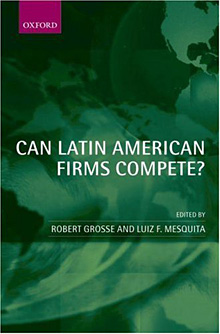Can Latin American Firms Compete?
 PVNN PVNN


| Can Latin American Firms Compete?
by Robert Grosse & Luiz F. Mesquita
Oxford University Press
Oct 2007, Pages: 448

Check it out at Amazon.com | | |
Can Latin American Firms Compete? examines the success and failure that Latin American firms have met with, in their own markets and elsewhere in the world, and the reasons behind this. Including contributions from leading international experts on business in Latin America, the book draws on concepts from a range of disciplines.

In many discussions of globalization and growth, attention focuses on Asia, notably China, South Korea, and India. In contrast, Can Latin American Firms Compete? looks at business developments in another key emerging market region, Latin America. It examines the success and failure that Latin American firms have met with, in their own markets and elsewhere in the world, the reasons behind these outcomes, and these firms future prospects.

Including contributions from leading international experts on business in Latin America, the book draws on concepts from organization theory, industrial organization, economics, marketing, sociology, and political science. It includes sections on broad themes of competitiveness in Latin America, micro-level strategies of firms in specific sectors, the competitiveness of firms in specific countries, and competing in emerging markets. Cases examined range in size and sector, and include some of the largest firms in Latin America, such as as Embraer in Brazil, Quinenco (Luksic) in Chile, Techint in Argentina, Grupo Carso in Mexico, Cisneros in Venezuela, and Grupo Empresarial Antioqueno in Colombia.

This well-informed book will be essential reading for academics, policy-makers, and those with a serious interest in business development in Latin America.

About the Author

Professor Robert Grosse is Director of the Leadership Development program at Standard Bank in Johannesburg, South Africa. He holds a B.A. degree from Princeton University and a doctorate from the University of North Carolina, both in international economics. He has taught international finance in the MBA programs at Thunderbird, the University of Miami, the University of Michigan, and at the Instituto de Empresa (Madrid, Spain), as well as in many universities in Latin America. As a consultant in international business he has worked for the US Commerce, State, and Treasury Departments, the Organization of American States, and the United Nations. Among the many companies he has served are: American Express, Anaconda, Banco Ganadero, Chase Manhattan Bank, Citibank, EXXON, IBM, Merrill Lynch, Raymond James, Texaco, YPF, and Xerox. Professor Luiz Mesquita is an Assistant Professor of Business Policy & Strategy, at the School of Global Management and Leadership, Arizona State University. He holds a masters degree in Applied Economics (1997) and a Ph.D. in Strategy from Purdue University. His research interests evolve around alliances among firms, and their effect on supply chain product exchanges. Prof. Mesquitas research also encompasses topics in international management such as the impact of inter-firm ties within industrial clusters, especially those in emerging markets such as Argentina and Brazil, and their effect on export performances, the corporate strategies of business groups in emerging economies, as well as the factors that impact the effectiveness of trust-facilitators in cluster development projects. In his latest research project, Dr. Mesquita analyzes cross-cultural differences among Latin American workers, and their relevance for managerial practices across the region. |



